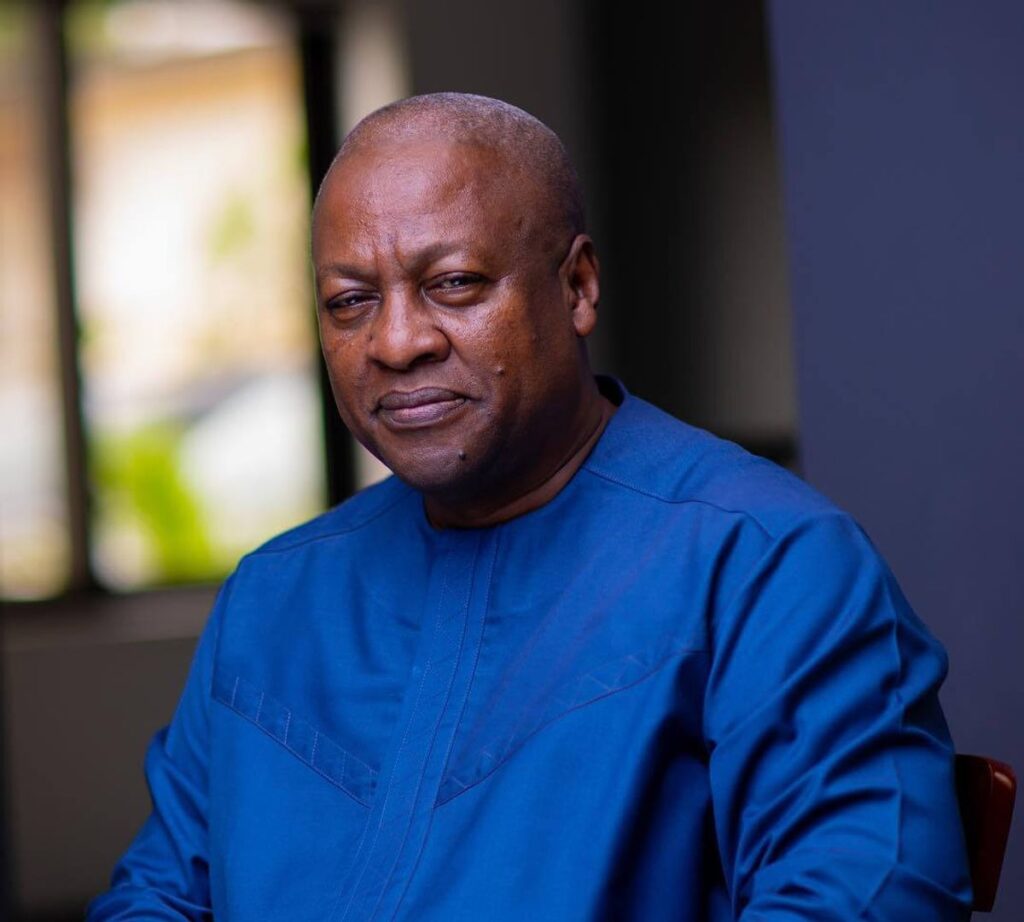Mahama: Rising Unemployment Crisis Threatens Ghana’s Emerging Democracy

Former President John Dramani Mahama, the Presidential Candidate for the National Democratic Congress (NDC), has sounded the alarm about the growing unemployment crisis in Ghana, warning that it poses a significant threat to the country’s fledgling democracy. He blamed the current situation on a disconnect between government policies and the real job outcomes, under the leadership of President Nana Addo Dankwa Akufo-Addo and Vice President Dr. Mahamudu Bawumia. Mahama argued that the failure to effectively address unemployment, jobless growth, and rising poverty is leading Ghana down a dangerous path, one that undermines both the economy and the democratic stability of the country. He stressed the need for a change in government to address these critical issues and restore hope to the people.
Mahama painted a grim picture of the current employment situation in Ghana, noting that the country is grappling with its highest unemployment rate ever, approaching 15%, while youth unemployment has skyrocketed to around 30%. He pointed out that these figures represent a national crisis that needs immediate attention. The former president stressed that the situation is compounded by high costs of doing business, stagnant wages, widespread poverty, and increasing economic inequality. Mahama argued that these interconnected issues are not just economic in nature; they also pose a serious threat to the country’s democratic development. He cautioned that without decisive action, Ghana could risk losing the social and political stability that has characterized its democratic journey.
In response to this crisis, Mahama outlined a series of bold and transformative policies that he believes will tackle the root causes of unemployment and economic stagnation in the country. At the core of his economic vision is the creation of sustainable, decent, and well-paying jobs for Ghanaians. He stressed that job creation will be the topmost priority for his government. To achieve this, Mahama unveiled his plans for a series of innovative measures aimed at revitalizing the economy and addressing the challenges of unemployment and jobless growth.
One of the key initiatives in Mahama’s plan is the 24-Hour Economy policy. This ambitious policy seeks to encourage businesses and public organizations to operate on a 24/7 basis, divided into three eight-hour shifts. Mahama explained that this policy would drive increased production, improve productivity across industries, and create more job opportunities. By enabling continuous operations, businesses will be able to meet demand more efficiently, boost economic output, and generate jobs across various sectors of the economy. This approach, Mahama believes, will inject new energy into the economy and address key productivity challenges.
In addition to the 24-Hour Economy policy, Mahama highlighted his vision for an import-substitution and export-led economy, which would shift Ghana’s focus from reliance on imports to building up domestic industries. This approach, he explained, would reduce the country’s dependence on foreign goods, stimulate local production, and create jobs. Mahama emphasized that his government would invest in industrialization to create a robust economy driven by locally produced goods. A significant part of this strategy is the establishment of agro-industrial zones in various regions, where locally sourced raw materials would be processed and added value to boost export potential.
Another major component of Mahama’s economic plan is the National Apprenticeship Programme. This initiative aims to provide young people with free technical and vocational training in various crafts, equipping them with skills to pursue self-employment and contribute to the economy. Upon completion of the training, apprentices will receive certification and be provided with start-up capital and necessary equipment to establish their own businesses. Mahama believes that by equipping young people with practical skills, the government can foster a new generation of entrepreneurs who will play a key role in the country’s economic transformation.
Mahama also introduced the “Adwumawura Programme,” a flagship initiative aimed at addressing the negative economic impact of the current Akufo-Addo-Bawumia administration. The programme is designed to support the creation, tracking, and mentoring of at least 10,000 businesses annually, with a focus on empowering young people. This initiative, Mahama explained, will help reduce the barriers to entrepreneurship and provide the necessary guidance and resources for young Ghanaians to start and sustain their businesses.
Additionally, Mahama proposed the creation of the Women’s Development Bank, a specialized financial institution that would provide low-interest loans and other tailored financial services to women-owned and women-led businesses. This bank, Mahama stated, would play a crucial role in the economic empowerment of women, offering them the financial support needed to grow their businesses and contribute more effectively to the national economy. By focusing on women’s economic empowerment, Mahama aims to unlock the untapped potential of women entrepreneurs and promote gender equality in the business sector.






